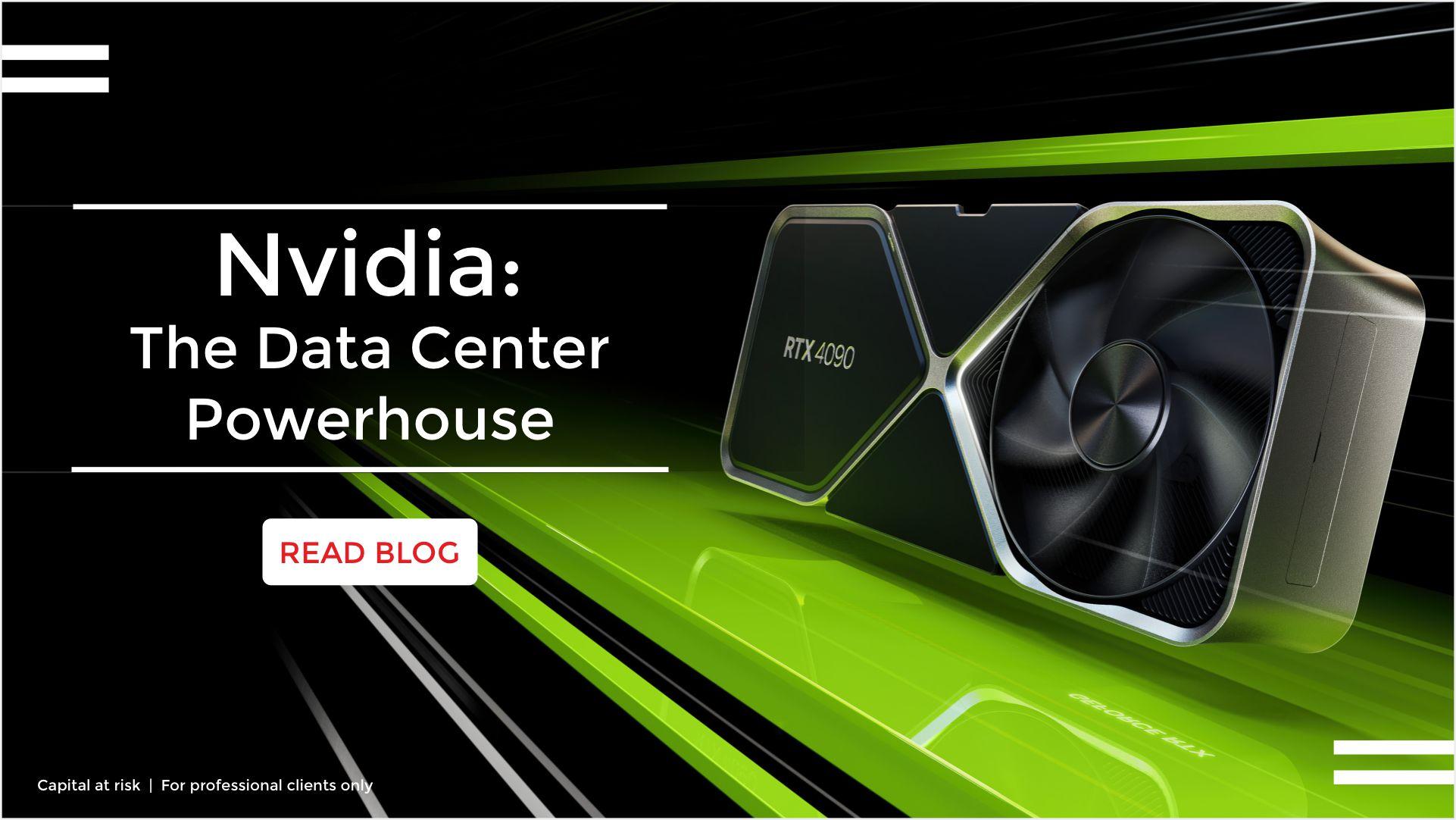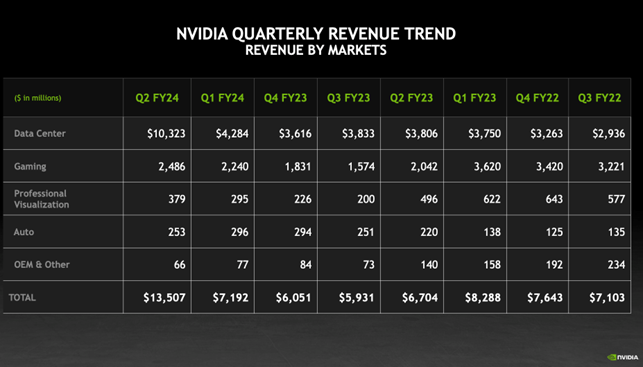Nvidia Data Center
Posted:
Nvidia: The Data Center Powerhouse
In the rapidly evolving landscape of technology, Nvidia (NVDA) has emerged as a veritable powerhouse in the realm of data centers. What began as a company primarily associated with high-performance graphics cards for gaming enthusiasts, over the years, transformed into a driving force behind some of the most groundbreaking advancements in data center computing.
Nvidia's journey from graphics processing to data center dominance is a testament to its innovative spirit and the strategic foresight that allowed it to pivot its expertise to cater to the burgeoning demands of artificial intelligence (AI), high-performance computing (HPC), and other data-intensive applications.
This transition to a data center powerhouse was catalyzed by the ever-increasing need for computing capabilities to process vast amounts of data. Utilizing GPU design expertise, Nvidia harnessed inherent parallelism to accelerate diverse computing tasks.
This realization led to the development of CUDA (Compute Unified Device Architecture), a parallel computing platform and programming model that empowers developers to tap into the immense processing power of GPUs. As industries began to adopt AI and deep learning for various applications, Nvidia's GPUs became instrumental in training and deploying complex neural networks, setting the stage for a new era of data-driven insights.
Nvidia's Data Center Solutions and Offerings
Nvidia's ascendancy as a data-centered business can be attributed to its comprehensive suite of cutting-edge solutions designed to empower the modern data-driven ecosystem. At the heart of its offerings are high-performance GPUs, which have transcended their initial role in graphics rendering to become the bedrock of accelerated computing.
These GPUs, purpose-built for data centers, excel in handling the most intricate computational workloads. They're the driving force behind AI and machine learning advancements, propelling tasks like neural network training and inferencing with unparalleled speed and efficiency. Moreover, their impact extends to scientific simulations, enabling researchers to model complex phenomena with unprecedented precision.
In its quest to optimize its data center business, Nvidia introduces the Data Processing Unit (DPU), a revolutionary component that focuses on data center security, networking, and efficiency. By offloading critical networking and security functions from the CPU, the DPU streamlines data processing pipelines, freeing up computing resources for more value-added tasks. This approach not only enhances data center agility but also bolsters security by creating isolated processing environments for different applications.
Nvidia's holistic approach, combining GPUs and DPUs with a robust software ecosystem, solidifies its position as a premier provider of data center solutions that address the evolving needs of AI, HPC, and the modern computing landscape.
Key Applications of Nvidia's Data Center Technologies
Nvidia's data center technologies have propelled transformative applications across a spectrum of industries, redefining possibilities and driving innovation. At the forefront is their pivotal role in Artificial Intelligence (AI) and Machine Learning (ML). Nvidia's high-performance GPUs have become the linchpin for training and deploying intricate AI models, powering applications from natural language processing to computer vision.
These technologies have revolutionized healthcare by expediting diagnoses through medical image analysis and enabling drug discovery through predictive modelling. In fields like finance, they facilitate risk assessment and fraud detection, while in autonomous vehicles, they underpin perception and decision-making systems that pave the way for safer transportation.
In the realm of High-Performance Computing (HPC), Nvidia's GPUs have accelerated scientific breakthroughs by tackling intricate simulations, from climate modelling to drug development. This capability extends to seismic analysis for disaster prediction, genomic sequencing for personalized medicine, and even the exploration of fundamental physics.
Nvidia's data center technologies have also democratized access to such power through cloud computing, enabling researchers, startups, and enterprises to leverage GPU-accelerated instances without the need for substantial hardware investments. As these technologies continue to evolve, they have the potential to drive advancements in previously unimaginable domains, from understanding the human brain to addressing complex societal challenges.
Impact of Nvidia's Data Center Innovations
The impact of Nvidia's data center innovations is nothing short of revolutionary, reshaping industries, accelerating scientific progress, and redefining the very architecture of data centers. At the forefront is the transformation of Artificial Intelligence (AI) and Machine Learning (ML). Nvidia's GPUs have catapulted the capabilities of AI models, enabling breakthroughs in healthcare diagnostics, where AI-powered image analysis enhances early detection of diseases like cancer.
Moreover, in autonomous vehicles, Nvidia's technologies have enabled sophisticated perception systems, driving the realization of self-driving cars and safer transportation. This influence extends across industries, from finance to retail, where AI-powered insights optimize operations and enhance customer experiences.
In High-Performance Computing (HPC), Nvidia's data center innovations have accelerated scientific discovery. Complex simulations that once took years can now be completed in a fraction of the time, expediting advancements in fields like climate modelling and drug development. This acceleration is particularly crucial for urgent challenges like understanding and responding to global climate change. The efficiency gains have also empowered researchers to probe deeper into the fundamental building blocks of the universe and unravel mysteries that were previously beyond reach.
Nvidia's data center innovations are not confined to performance gains alone. They have redefined data center architecture by introducing the Data Processing Unit (DPU), which offloads critical functions from CPUs, enhancing both security and efficiency.
Leveraging its prowess in designing Graphics Processing Units (GPUs) tailored for graphics-intensive tasks, Nvidia recognized the intrinsic parallelism inherent in GPUs, and in AI training, harnessed this trait to accelerate general-purpose computing tasks.
With these advancements, Nvidia has not only set new benchmarks in computational power but has also shaped the very way data centers operate, providing a blueprint for the evolving demands of modern computing. As Nvidia continues to push boundaries, its impact on industries and scientific progress is poised to be a driving force in shaping the future of technology.
Competition and Collaboration in the Data Center Space
Competition in the Data Center Space:
In the fiercely competitive landscape of the data center space, several technology giants are vying for supremacy, each armed with innovative solutions to capture a larger share of the market. Among Nvidia's prominent competitors is Advanced Micro Devices (AMD), which has been steadily gaining ground with its EPYC processors that offer impressive computing power and energy efficiency.
AMD's Radeon Instinct GPUs also directly challenge Nvidia's dominance in GPU acceleration for AI and HPC workloads. Intel, a long-standing player in the industry, is evolving its Xeon processors and Optane memory technologies to cater to data center demands, positioning itself as a formidable contender in the race for data center supremacy.
The competition extends beyond traditional hardware manufacturers, as cloud providers such as Amazon Web Services (AWS), Microsoft Azure, and Google Cloud build their proprietary data centers to accommodate the massive demand for cloud computing resources. These cloud giants often develop custom hardware solutions optimized for their specific workloads, posing both competition and partnership opportunities for hardware providers like Nvidia.
Collaborations and Synergies:
In this highly competitive arena, collaborations have become integral to driving innovation and expanding market reach. Nvidia's strategic collaborations with cloud providers, such as its partnerships with AWS, Azure, and Google Cloud, have enabled a wider audience to access its GPU-powered instances and AI capabilities. These partnerships allow developers to harness Nvidia's cutting-edge technologies without the need for significant upfront hardware investments, fostering more democratized access to high-performance computing.
Furthermore, Nvidia collaborates closely with software developers and researchers by providing GPU-accelerated libraries and frameworks. CUDA, Nvidia's parallel computing platform, has become a staple for GPU programming, while deep learning frameworks like TensorFlow and PyTorch have been optimized for Nvidia GPUs, cementing the company's role as an enabler of software innovation.
Financial Performance
NVIDIA released its Q2 FY2024 results on August 23, 2023, with an incredible $6.7 billion in net income for the quarter. It represents a massive 843% increase on a year-over-year (YoY) basis and a 203% increase quarter on quarter (QoQ). Nvidia's revenue grew by 101% from a year ago to $13.51 billion. (Source: NVIDIA)
Data Center, which consists of its critical AI unit recorded second-quarter revenue of $10.32 billion and was up by 171% YoY. In addition to cloud providers, big internet companies make up the majority of the company's revenue from its data centers. Data center growth at Nvidia was driven by computing chips also called AI chips. The rise in Data center sales was fueled by a significant amount of software and complexity which is also contributing to its gross margins. (Source: NVIDIA)
Nvidia's Gross margin increased by nearly 25% on a YoY basis to 71.2% which is remarkable for a physical commodity. The recent growth of the company has beaten Wall Street analyst expectations. (Source: NVIDIA)
On August 23, 2023, Nvidia stock price surged by around 9% after hours. The stock has so far gained more than 200% in this year alone. (Source: CNBC)

(Source: NVIDIA)
Conclusion
In conclusion, Nvidia has emerged as a true data center and AI powerhouse, orchestrating a remarkable transformation from its origins in gaming GPUs to a leading force in AI, HPC, and beyond. Its journey reflects a dynamic blend of technological innovation, strategic collaborations, and fierce competition that collectively shape the data center landscape.
Through a sophisticated array of high-performance GPUs and pioneering technologies like Data Processing Units (DPUs), Nvidia has not only redefined computational capabilities but also revolutionized industries, from healthcare to automotive, by enabling groundbreaking applications in AI, deep learning, and scientific research.
As the data center space continues to evolve, Nvidia's impact remains indelible. Its influence extends beyond hardware to encompass software ecosystems, partnerships, and an overarching commitment to driving progress. With a keen eye on responsible AI usage and the potential ethical implications of its technologies, Nvidia stands poised to not only shape the future of data centers but also set new benchmarks for responsible, transformative technological advancement.
The story of Nvidia as a data center powerhouse is a testament to its ability to embrace change, foster collaboration, and drive innovation on a global scale, leaving an enduring legacy in the ever-expanding realm of data-driven possibilities.
NVIDIA ETPs by GraniteShares
| Product name | Ticker | ||
|---|---|---|---|
| USD | EUR | GBX | |
DISCLAIMER
Please note that GraniteShares' short and leveraged Exchange Traded Products are suitable only for sophisticated investors.
This is a disclaimer stating that all trading and investing comes with risks. Always do your research and do not invest more than you can afford to spend.
GraniteShares accepts no responsibility for any loss or damage resulting directly or indirectly from the use of this blog or the contents. GraniteShares Limited (“GraniteShares”) (FRN: 798443) is an appointed representative of Messels Limited which is authorised and regulated by the Financial Conduct Authority.
This blog does not constitute an offer to buy or sell or a solicitation of an offer to buy securities in any company. Nothing contained herein constitutes investment, legal, tax or other advice nor is to be relied upon in making an investment or other decision. No recommendation is made positive or otherwise, regarding individual securities or investments mentioned herein. Any summary list of risk factors does not purport to be a complete enumeration or explanation of the risks involved in a particular investment. Prospective clients must consult with their own legal, tax and financial advisers before deciding to invest. This email contains the opinions of the author and such opinions are subject to change without notice. The source of data is GraniteShares unless otherwise stated. No guarantee is made to the accuracy of the information provided which has been obtained from sources believed to be reliable. This email and the information contained herein is intended only for the use of persons (or entities they represent) to whom it has been provided. Past performance is not a reliable indicator of future results. The value of an investment may go down as well as up and can result in losses, up to and including a total loss of the amount initially invested. Investments may involve numerous risks including, among others, company risks, general market risks, credit risks, foreign exchange risks, interest rate risks, geopolitical risks and liquidity risks. Please note that GraniteShares short and leveraged Exchange Traded Products are for sophisticated investors.


